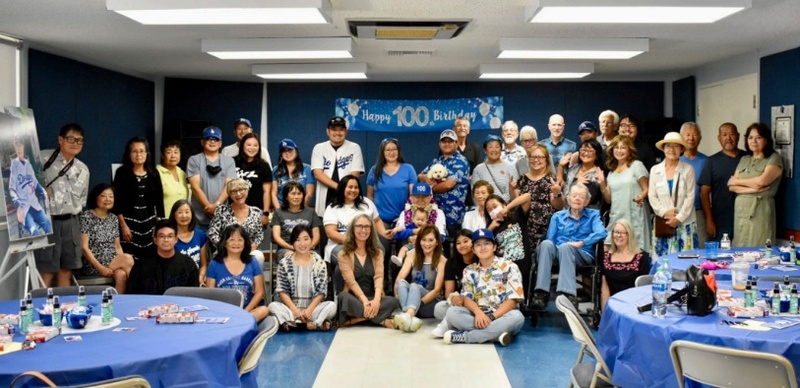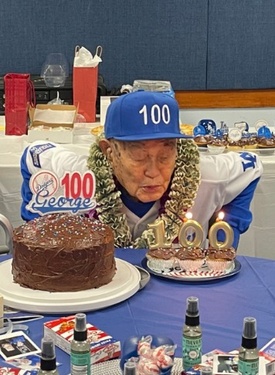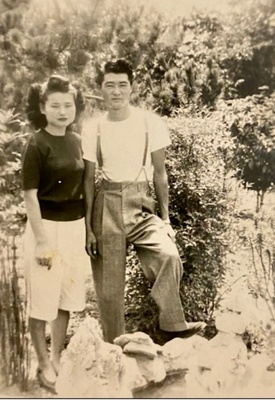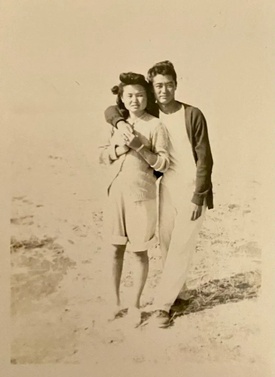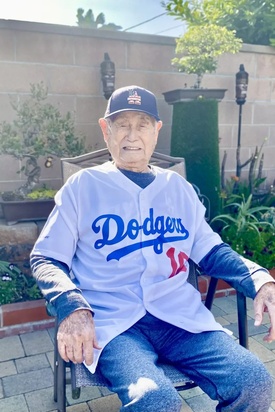George Mayeda celebrated his 100th birthday this year. He was born in Riverside on June 13, 1922, one of eventually five siblings. His father and mother had come to California from Japan. His father worked as a foreman in a packing house for produce and a pool hall during the off-season.
At five or six years old, he and his older brother Tom went to Japan for several years to live with their uncle while the family focused on work, gardening in the Hollywood area and taking care of their siblings Tane and Sam. When the brothers returned, their new brother Shoji had been born, and the family had relocated to San Gabriel. Here, they had started a collection of businesses with a gas station, pool hall, and grocery store.
When the U.S. entered into World War II, President Roosevelt’s Executive Order 9066 led to the incarceration of Japanese American citizens living along the West Coast. Like 120,000 other people of Japanese descent, he and his family would be forcibly relocated and imprisoned in internment camps.
Most families had to leave all of their belongings behind or sell them for dirt cheap. Fortunately, a family the Mayedas were acquainted with held their belongings and property for them and rented their businesses while they were in the camps.
Tulare Race Track near the Sequoia National Forest was their first destination. The track had been converted into a processing center and internment camp where horse stalls had been crudely turned into sleeping quarters.
They later moved on and eventually found themselves at the Gila River Relocation Center in the Arizona desert, where they would stay for the next several years. The center was built on the Gila River Indian Reservation. Two internment facilities were established here, Canal and Butte Camps. There were rows of military-style barracks — large wooden shacks — set up, the grounds fenced in and patrolled by armed guards. George remembers they had to hang sheets to partition different families’ living quarters.
George did a number of things for work while at Gila. He worked with cattle and learned how to ride a horse, fixing fences. He washed dishes and delivered ice to the mess halls. (The “good, clear ice,” George says, was saved for their friends.) He worked in the post office, where he and his friends would occasionally sneak into town to go to the movies in the back of the postal truck. Seasonally, he worked on a farm outside of the camp, harvesting and separating sugar beans. On the nearby railway, he hammered nails, sleeping on the tracks some nights.
During the war, his older brother Tom was in the Army as an interpreter based in Korea. George himself was nearly drafted, and even had his physical examination, but the war ended shortly beforehand.
Also, while in Gila, he met his future wife Fumi. She was close friends with his younger sister Tane.
Finally released from camp, George and his family moved back to San Gabriel, where they were able to resume their business. Some of Fumi’s family had moved to Chicago as the war was ending, but she eventually came to San Gabriel to be with George. They married in 1946 and had their own house built in the area.
George and his brothers Tom and Shoji began working as gardeners. They joined a bonsai organization taught by famed bonsai master John Naka, and George remembers one of his bonsai being featured in one of Naka’s magazines. Sometimes, in the early morning, they would travel up to the mountains and dig for trees to use for their own personal bonsai projects.
Fumi had been working cleaning houses, but later went to night school after the birth of their daughters Hannah and Jan. She would go on to work for the Bell Telephone Company, key-punching and later as a secretary. Eventually she quit working to help take care of their first grandchild, Heather. George continued his work as a gardener to a loyal clientele in the San Gabriel Valley until retiring at the age of 85. Fumi and George moved in with their daughter Hannah for several years, before moving into the Leisure World community.
Recreationally, George’s life has been filled with fishing trips and bowling leagues. There have been trips to the local swap meet, or to Santa Anita Race Track to bet on the horses. Las Vegas with the family. The annual Christmas potluck and gift exchange with the gathering of the Mayedas (with so much food). Fourth of July fireworks in the street. Kicking people’s butts at pool.
In 2018, Fumi Mayeda passed away. George likes to keep fresh cut flowers from their garden for her in one of the blue vases she collected.
“I think I was pretty lucky to marry her. She was a really smart woman.”
On weekends, George visits with his daughters, winning rounds of pool at Jan and Tim Sadler’s place, or taking a short walk over to his daughter and Leisure World neighbor, Hannah. Most days, though, he can be found watching his favorite game shows and westerns, or rooting for the Dodgers. He also enjoys visits from Heather, Jorge, and (his great-grandson) Noah Valerio, who introduced him to watching NASCAR races. Their dog Sofie is always excited to see Papa, too.
He’ll often check on the upkeep of the plants in his garden while out for his daily walk and assist with grafting the plumeria plant to coax out different-colored flowers.
His grandson Kyle Sadler has been his caregiver since the pandemic, and continues to keep him happy with kimchi grilled cheese sandwiches or bowls of takeout pho.
“I’ve had a pretty good life so far.”
*This article was originally published by the Rafu Shimpo on July 17, 2022.
© 2022 Kyle Sadler / Rafu Shimpo


